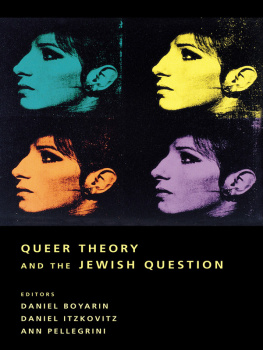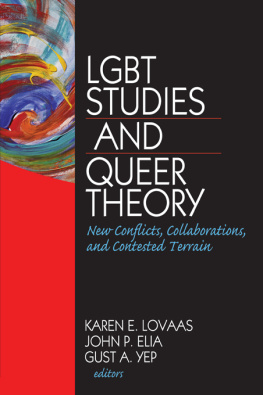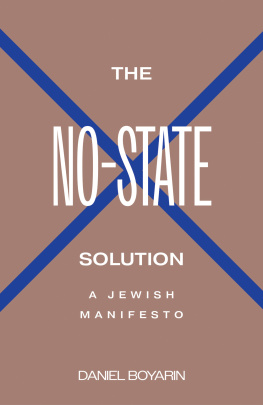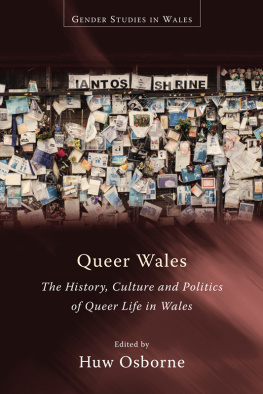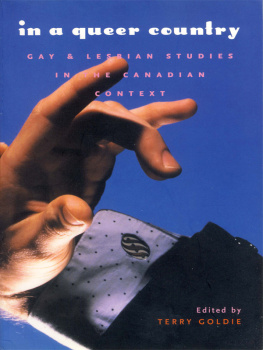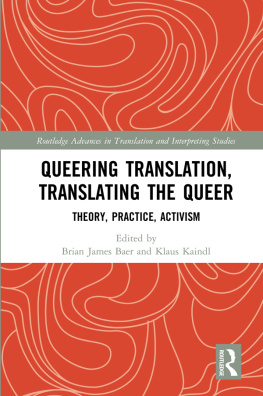QUEER THEORY AND THE JEWISH QUESTION
BETWEEN MEN BETWEEN WOMEN
LESBIAN, GAY, AND BISEXUAL STUDIES
LILLIAN FADERMAN AND LARRY GROSS, EDITORS
QUEER THEORY AND THE JEWISH QUESTION
Daniel Boyarin, Daniel Itzkovitz,
and Ann Pellegrini, Editors
COLUMBIA UNIVERSITY PRESS
NEW YORK

COLUMBIA UNIVERSITY PRESS
Publishers Since 1893
New York Chichester, West Sussex
Copyright 2003 Columbia University Press
All rights reserved
E-ISBN 978-0-231-50895-7
Library of Congress Cataloging-in-Publication Data
Queer theory and the Jewish question / Daniel Boyarin,
Daniel Itzkovitz, and Ann Pellegrini, editors.
p. cm.(Between menbetween women)
ISBN 0231113749 (cloth : alk. paper)
ISBN 0231113757 (pbk. : alk. paper)
1. Jewish gays. 2. Jewish lesbians. I. Boyarin, Daniel. II. Itzkovitz, Daniel. III. Pellegrini, Ann IV. Series.
HQ75.15.Q5 2003
305.8924dc21
2003048494
A Columbia University Press E-book.
CUP would be pleased to hear about your reading experience with this e-book at .
Between Men Between Women
Lesbian, Gay, and Bisexual Studies
Lillian Faderman and Larry Gross, Editors
Advisory Board of Editors
Claudia Card
Terry Castle
John DEmilio
Esther Newton
Anne Peplau
Eugene Rice
Kendall Thomas
Jeffrey Weeks
Between Men Between Women is a forum for current lesbian and gay scholarship in the humanities and social science. The series includes both books that rest within specific traditional disciplines and are substantially about gay men, bisexuals, or lesbians and books that are interdisciplinary in ways that reveal new insights into gay, bisexual, or lesbian experience, transform traditional disciplinary methods in consequence of the perspectives that experience provides, or begin to establish lesbian and gay studies as a freestanding inquiry. Established to contribute to an increased understanding of lesbians, bisexuals, and gay men, the series also aims to provide through that understanding a wider comprehension of culture in general.
Contents
Books, especially coedited volumes such as this, are works of passionate collaboration. In addition to the named contributors to this volume, there are thus other names to name. At Columbia University Press, Jennifer Crewe, Ann Miller, and Susan Pensak were unwavering in their support and patience. Lillian Faderman and Larry Gross early on signaled their confidence in this volume by making us part of Between Men Between Women. Sarita Rainey turned a fine eye on the index, providing crucial assistance at the eleventh hour. We are honored to have Deborah Kasss 4 Barbras (The Jewish Jackie Series) grace this books cover. This volumes intellectual pulse has been quickened by the path-clearing work of so many in Jewish studies and Jewish feminist studies as well as in lesbian and gay studies and queer theory. We cannot begin to name, never mind adequately thank, them all, but some particular shout-outs to Jonathan Boyarin, Michael Bronski, Carolyn Dinshaw, Leslie Fiedler, Diana Fuss, Sander Gilman, David M. Halperin, Laura Levitt, and Miriam Peskowitz. Finally, we must acknowledge the friendship and support of some others who have made this volume possible: Carlin Barton, Chava Boyarin, Virgina Burrus, Elizabeth A. Castelli, Aden Evens, Lila Itzkovitz, Ivan Kreilkamp, Natasha Lifton, John Plotz, Linda Schlossberg, Susan Shapiro, and Dina Stein.
The essays in this volume explore the relays between Jewishness and queerness, between homophobia and antisemitism, and between queer theory and theorizations of Jewishness. The volume is not so much interested in revealingouting?queer Jews as it is in exploring the complex of social arrangements and processes through which modern Jewish and homosexual identities emerged as traces of each other. Queer Theory and the Jewish Question thus enacts a change in object from uncovering the hidden histories of homosexuals who were also Jewish or Jews who were also homosexual to analyzing the rhetorical and theoretical connections that tie together the constellations Jew and homosexual. While there are no simple equations between Jewish and queer identities, Jewishness and queerness yet utilize and are bound up with one another in particularly resonant ways. This crossover also extends to the modern discourses of antisemitism and homophobia, with stereotypes of the Jew frequently underwriting pop cultural and scientific notions of the homosexual. And vice versa.
To bring the matter to a sharper point: there may just be something queer about the Jew and something, well, racy about the homosexual. Among other things, this means that the circuit jew-queer is not only theoretical but has hadand still hasprofound implications for the ways in which Jewish and queer bodies are lived. (Certainly, the interconnections have had implications for how Jewish and queer bodies have died.)
The popular notion that Jews embodied non-normative sexual and gender categories is long-standing. Recent work in Jewish cultural studies by Jay Geller (Paleontological), Sander Gilman (Freud, Race, and Gender), and others documents attributions of softness to Jewish men predating the nineteenth and twentieth centuries, the historical period addressed by most of the essays in this volume. Moreover, in his Nationalism and Sexuality George Mosse offered an in-depth exploration of the intertwined discourses of masculinity, citizenship, and nationalism in post-Enlightenment Europe (especially in Germany) as well as the ways that Jews (especially but not only Jewish men) were powerfully associated with the abjected homosexual in these discourses.
Provocatively, these stereotypes of Jewish gender trouble were not always rejected by Jews themselves. Indeed, in his 1997 study Unheroic Conduct: The Rise of Heterosexuality and the Invention of the Jewish Man Daniel Boyarin identifies traces of a soft Jewish masculinity in the Talmud and the succeeding culture of rabbinic Judaism. Boyarin proceeds to make a claim for the effeminization of Jewish masculinity as a sort of oppositional (and incipiently postcolonial) discourse. For Jews living under the Roman Empire, he suggests, the softness of rabbinic masculinity with its focus on study and texts might have offered a rallying point for Jewish self-affirmation over and against a hard, martial Roman-ness. Of course, as Boyarin also makes clear, this valorization of male effeminacy could go hand in hand with the devaluation of women. That is, the cultural value rabbinic Judaism placed on soft masculinity was in no way a rebuff of patriarchy and male privilege. Additionally, later intra-Jewish developmentsHerzls Zionism, for example, with its idealized muscle Jewsuggest that over time the positive valence Jewish gender difference may have held for some Jews would become increasingly difficult to sustain.
Certainly, by the mid-nineteenth century antisemitic stereotypes of a weak and passive Jewish masculinity were given dangerous new direction when they were grafted onto emerging discourses of race and sexuality. New scientific disciplines helped to produce and codify social and moral distinctions between groups by identifying essential markers of difference and grounding them in nature (Geller, (G)nos(e)ology). This biologization of difference can be seen in the invention or, perhaps more accurately, reinvention of Jewish difference as a matter of race. It was as if Jewish gender and sexual life, both real and imagined, provided the key to unlocking Jewish racial difference. Long-standing stereotypes of Jewish gender difference were thus translated into signs of racial difference, operating as a kind of visible proof text. So, for example, the alleged failure of the male Jew to embody proper masculinity became the indelible evidence of the racial difference of all Jews.
Next page
